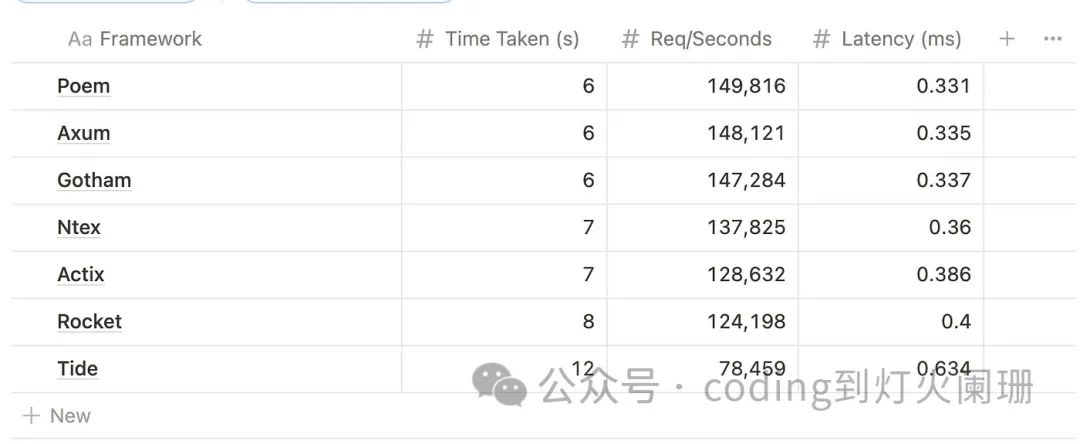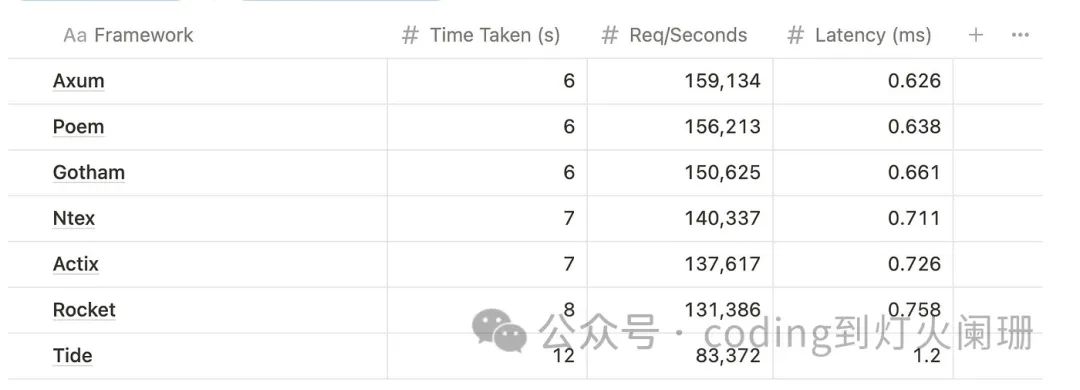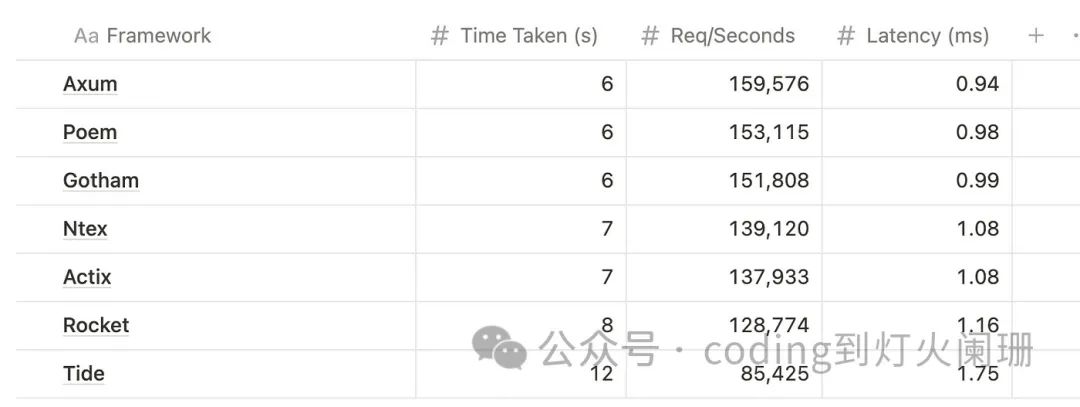最快的Rust web框架
随着Rust越来越受欢迎,选择正确的web框架变得至关重要。我们将使用“Hello World”基准测试来比较Actix、Axum、Rocket、Tide、Gotham、Nickel、Ntex和Poem这些Rust web框架的性能。
测试方法
为了确保公平和标准化的比较,我们对上述每个web框架进行了基本的“Hello World”基准测试。
这涉及到创建一个最小的web服务器,它用“Hello, World!”消息发送给传入的HTTP请求。基准测试是在同一台机器上进行的,每个框架都对其速度,资源使用和易于实现进行了评估。
负载测试用的是apache bench,我们测试的是release构建版本。
各框架的代码如下:
Actix
[dependencies]
actix-web = "4"use actix_web::{get, App, HttpResponse, HttpServer, Responder};
#[get("/")]
async fn hello() -> impl Responder {
HttpResponse::Ok().body("Hello world!")
}
#[actix_web::main]
async fn main() -> std::io::Result<()> {
HttpServer::new(|| {
App::new()
.service(hello)
})
.bind(("127.0.0.1", 8080))?
.run()
.await
}Axum
[dependencies]
axum = "0.7.3"
tokio = { version = "1.0", features = ["full"] }use axum::{response::Html, routing::get, Router};
#[tokio::main]
async fn main() {
let app = Router::new().route("/", get(handler));
let listener = tokio::net::TcpListener::bind("127.0.0.1:8080")
.await
.unwrap();
println!("listening on {}", listener.local_addr().unwrap());
axum::serve(listener, app).await.unwrap();
}
async fn handler() -> Html<&'static str> {
Html("Hello world!")
}Rocket
[dependencies]
rocket = "0.5.0"#[macro_use] extern crate rocket;
#[get("/")]
fn hello() -> String {
format!("Hello world!")
}
#[launch]
fn rocket() -> _ {
let config = rocket::Config {
port: 8080,
log_level: rocket::config::LogLevel::Off,
..rocket::Config::debug_default()
};
rocket::custom(&config)
.mount("/", routes![hello])
}Tide
[dependencies]
tide = "0.16.0"
async-std = { version = "1.8.0", features = ["attributes"] }#[async_std::main]
async fn main() -> Result<(), std::io::Error> {
let mut app = tide::new();
app.at("/").get(|_| async { Ok("Hello world!") });
app.listen("127.0.0.1:8080").await?;
Ok(())
}Gotham
[dependencies]
gotham = "0.7.2"use gotham::state::State;
pub fn say_hello(state: State) -> (State, &'static str) {
(state, "Hello world!")
}
// 启动一个服务器,并为我们收到的每个“请求”调用上面定义的“处理程序”。
pub fn main() {
gotham::start("127.0.0.1:8080", || Ok(say_hello)).unwrap()
}Ntex
[dependencies]
ntex = { version= "0.7.16", features = ["tokio"] }use ntex::web;
#[web::get("/")]
async fn index() -> impl web::Responder {
"Hello, World!"
}
#[ntex::main]
async fn main() -> std::io::Result<()> {
web::HttpServer::new(||
web::App::new()
.service(index)
)
.bind(("127.0.0.1", 8080))?
.run()
.await
}POEM
[dependencies]
poem = "1.3.59"
tokio = { features = ["rt-multi-thread", "macros"] }use poem::{
get, handler, listener::TcpListener, middleware::Tracing, EndpointExt, Route, Server,
};
#[handler]
fn hello() -> String {
format!("Hello world!")
}
#[tokio::main]
async fn main() -> Result<(), std::io::Error> {
let app = Route::new().at("/", get(hello)).with(Tracing);
Server::new(TcpListener::bind("0.0.0.0:8080"))
.name("hello-world")
.run(app)
.await
}测试结果
对于50、100和150个并发,每个测试总共执行了1000000个请求。结果如下表所示:
50并发
100并发
150并发
从结果看,Tide是最慢的(只能在12秒内完成1M请求,平均为159K Req /秒),Axum是最快的(可以在6秒内完成1M请求),所有Web框架的资源使用情况几乎相同。
注意:这只是基于什么都不做的“hello world”的基准测试。在更复杂的场景中,获胜的优势可能没有那么大。


